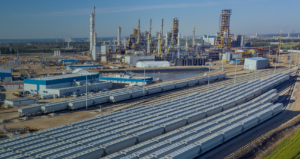
Shaping a bold new era in plastics packaging
By David Marnalse and Julio Muzquiz, Heartland Polymers
Canadian Plastics Materials Recycling Research & Development SustainabilityIntegrated teams hyper-customize to push boundaries.

The Heartland Petrochemical Complex, located north of Edmonton, Alberta. Photo Credit: Heartland Polymers
It’s an exciting time in the packaging industry as several factors combine to elevate our solutions to new levels of innovation, sustainability, performance, and flexibility. With the growth of e-commerce and home-delivery in recent years, our approach to packaging has evolved. This trend, coupled with ongoing consumer expectations for heightened sustainability, is converging with the rapid rise of digitization and evolving production technology. The result is an exciting new era in packaging in which polymer resin producers are working in close collaboration with manufacturing partners to create solutions we never thought possible.
For example, with more expectations being placed on the reliability aspect of caps and closures, producers have an opportunity to step up and deliver the high-quality resins backed by robust technical support that modern manufacturers demand. We are required to understand the end-use demands – to be stronger, more durable, lighter weight, more flexible, clearer, heat or cold resistant, etc. – as well as the specifications for all production equipment in use, and how to optimize for maximum efficiency. In today’s market, in fact, the technical expertise on the producer’s end might be just as important as producing and delivering a quality and consistent product.
Customization, quality, consistency
Hyper-customization means finding and delivering the perfect product for our customer’s very specific needs: they may look alike to the casual eye, but we know that every package, every film, every cap and closure, every personal hygiene product requires proprietary customization with zero room for variance between shipments. We know every minute of downtime, extra cleaning, and re-runs is money off the bottom line. For example, Heartland’s H3003 biaxially oriented polypropylene (BOPP) film extrusion resin has been found to have an excellent processing window allowing for even faster production speeds.
Products that deliver low VOC, faster and better processing, along with enhanced down gauging capabilities, come with higher value. All polymers when melted emit some level of volatiles, but leading production technology and less additives can significantly reduce those volatiles. The less additives, the fewer things that can break down and create problems for the converter on their end. That’s why quality assurance is paramount to making technical recommendations with confidence. For example, Heartland Polymers has conducted trials at the Non-Wovens Institute – the world’s first accredited academic program for the interdisciplinary field of engineered fabrics – to test and verify product quality. Recent trials found the product runs exceptionally well, which translates to less equipment maintenance as well as the potential for improved processability.
Advancing sustainability through production technology
Smart technologies also enable technical support and QC teams to zero in on exact moments in time during the production process and to track shipments with real-time GPS, offering greatly enhanced capabilities and recording. These platforms allow teams on both ends to co-ordinate and respond faster than ever before to issues. The area of AI and digitization is a separate topic with massive implications, but suffice to say that data is power and from consumers all the way back to the producer, transparency creates common ground. Put simply, the more consumers understand how we make things, the better it is for everyone.

When it comes to sustainability, the plastics industry is no longer trying to keep up with consumer demands and expectations, we are leading new ground through research and the adoption of emerging technologies. Today, there can be no trade-off between performance and sustainability: manufacturers and their customers expect both. It is by integrating technical teams across producer and manufacturer that we gain the boots-on-the-ground reality of what is required, what is possible, and what optimizations are required on both ends. Through communication and a shared vision of what success looks like, we are delivering on products with increased recyclability, lighter weight, more durable, and extremely flexible.
David Marnalse is a Senior Account Manager at Heartland Polymers. With over 25 years in the industry, he is committed to delivering a new and more efficient customer experience to help industry meet the challenges of modern production.
Julio Muzquiz is the Technical Services Supervisor at Heartland Polymers. He brings unparalleled technical expertise to Heartland backed by more than 25 years of providing polyolefins technical support for High Density Polyethylene (HDPE), Linear Low Density Polyethylene (LLDPE), and Polypropylene (PP) resins.
